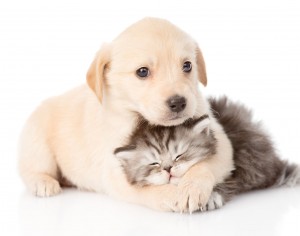 Avocado
Avocado
Avocado contains a toxin called persin. It is found in the fruit, seeds, leaves, and bark of the avocado plant. It is considered mildly toxic to dogs and cats, and can cause diarrhea and vomiting. Persin is even more dangerous for birds, horses, cattle, and goats. In addition to the toxin, the avocado pit poses a choking hazard to dogs and cats, and can cause intestinal blockage.
Cooked Bones
If you’re confused on the bone question, you are not alone. Cooked bones should never be given to your dog or cat. They pose a number of life-threatening danger. Cooked bones can splinter and cause perforations in the esophagus and intestinal tract. They can cause severe injuries inside the mouth, leading to severe infection, and requiring teeth to be removed. The can get stuck in the esophagus, windpipe, stomach, or intestinal tract, posing a life-threatening emergency which may require surgery to correct.
Raw bones are safer and can provide important health benefits. However, you still need to do your research and choose the raw bones that are safe for your pet. Small bones and pieces of bones still pose a choking hazard. Your dog or cat should only chew raw bones while supervised.
Onions, Garlic, and other Members of the Allium Family
Onions, garlic, chives, shallot, leeks, and rakkyo are members of the allium family. They all contain compounds that, in cats and dogs, can damage red blood cells and cause them to burst. The condition is called hemolytic anemia. Raw, cooked, and powdered forms of onion, garlic, and other allium plants are all dangerous.
Broth and baby food are often recommended for pets who will not eat or who are not feeling well, but are not always safe because they often contain onion and/or garlic.
Grapes, Raisins, and Currants
The reason why is not yet fully understood, but grapes, raisins, and currants can cause acute kidney failure. It is more common in dogs in cats, possibly because dogs are more likely to eat grapes and raisin. It also appears that the problem occurs with large doses, but at this point there is little data on the danger and it is recommended to avoid grapes and raisins for both dogs and cats in any amount.
Milk
It is a common myth that milk is good for cats. Most cats and dogs are lactose intolerant. That’s not a problem. It is normal and natural for them. Their bodies don’t produce much lactase, which is the enzyme that breaks down lactose. Milk can cause vomiting, diarrhea, upset stomach, and skin reactions in dogs and cats.
Kittens and puppies who are not old enough to wean should not be given cow’s milk or baby formula. They need milk-replacer that is formulated specifically for kittens or puppies.
Leave a Reply